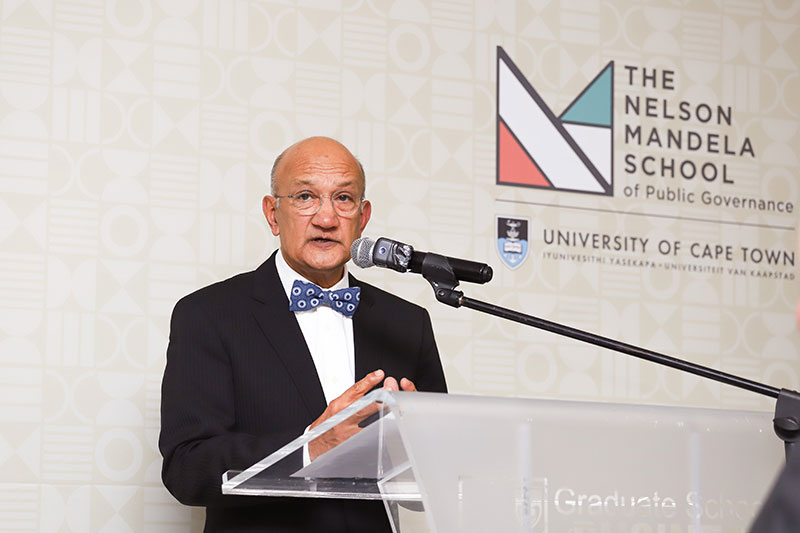Nelson Mandela School of Public Governance – a decade on
23 July 2024 | Story Kamva Somdyala. Photos Je’nine May. Read time 4 min.
The University of Cape Town’s (UCT) Nelson Mandela School of Public Governance, which forms a part of the Faculty of Commerce, reached a significant milestone in 2024: 10 years of teaching and learning.
It is a moment that called for celebration, and so on 18 July staff, students and alumni gathered at the UCT Graduate School of Business (UCT GSB) to mark the milestone on Nelson Mandela International Day. Businessperson and activist Cheryl Carolus delivered the keynote address.
Before Carolus spoke, Vice-Chancellor interim Emeritus Professor Daya Reddy said: “This milestone is a testament to the dedication, vision, and hard work of many individuals over the past decade. Alan Hirsch, the school’s first director, brought extensive experience from his roles in the South African Department of Trade and Industry and the Presidency, where he managed economic policy and represented South Africa at the G20. His vision was to build a network of emerging and established African public sector reformers, focusing on the practical aspects of development policy. Alan’s leadership and commitment laid a strong foundation for the school, making significant strides in establishing its core programmes.”

The mission of the school is to build inclusive, developmental, entrepreneurial and effective democratic African public institutions and strengthen ethical leadership for social change and sustainable development, in partnership with government, the private sector and civil society.
“The vision remains clear: to inspire and equip the next generation of African leaders to drive sustainable development and positive change.”
“In 2018, the school proudly adopted the name of Nelson Mandela, aligning its identity with his values of ethical leadership and social justice. This renaming was more than symbolic; it reaffirmed the school’s dedication to embodying Mandela’s legacy in its work and teachings,” said Emeritus Professor Reddy.
“The school is also proud to be part of UCT’s Development Studies offering, ranked 12th in the world in 2023, reflecting our commitment to academic excellence. As we look to the future, the school is committed to expanding its academic programmes, strengthening its networks across Africa and the world, and continuing to build capacity with an African perspective. The vision remains clear: to inspire and equip the next generation of African leaders to drive sustainable development and positive change,” said Reddy.
Transformation in higher education
“The school’s strategic alignment with UCT’s mission and the African Union’s Agenda 2063 showcases its role in promoting democratic governance, regional development, social inclusion, and public policy implementation,” remarked director of the school, Professor Faizel Ismail.
Ismail said the school is an “integral part of UCT’s structure, contributing significantly to its broader vision of excellence and transformation in higher education”.

When it was Carolus’ turn to address attendees, she used her time to call out the state of world leaders. She said she was both saddened and angered by the posture of some of the politicians she’s known for years.
“We gather to celebrate the vision, resilience and longevity of an institution conceptualised in hope, and sustained with wisdom and courage. We hold the celebration on Madiba’s birthday at a very troubled time in the world. There is no region in the world that is not suffering the consequences of conflict. These conflicts are avoidable, but one can safely say they were carefully orchestrated and fuelled by political leaders in furtherance of their own selfish, nefarious agenda,” she said.
“The students at the school carry the seeds of hope and of promise.”
“Corruption, crime and conflict are ingredients of a toxic cocktail that undermines inclusive growth, development and prosperity. It manifests in the hunger and famine resulting from conflict (Sudan and Palestine). It results in starvation and desperate fleeing of families. It results in innocent people being bombed in so-called safe zones; it results in children’s bodies washing up on shores.”
Carolus added: “Today I am saddened that so many people we were in the trenches with have chosen corruption, bribery and other forms of criminality. I am angry with them because they know better. I ask you to own your power and to use it well.”
She congratulated the school on the achievement, calling it 10 years of “wisdom” and “courage”. “The students at the school carry the seeds of hope and of promise. Use your power to make Africa great.”
 This work is licensed under a Creative Commons Attribution-NoDerivatives 4.0 International License.
This work is licensed under a Creative Commons Attribution-NoDerivatives 4.0 International License.
Please view the republishing articles page for more information.










